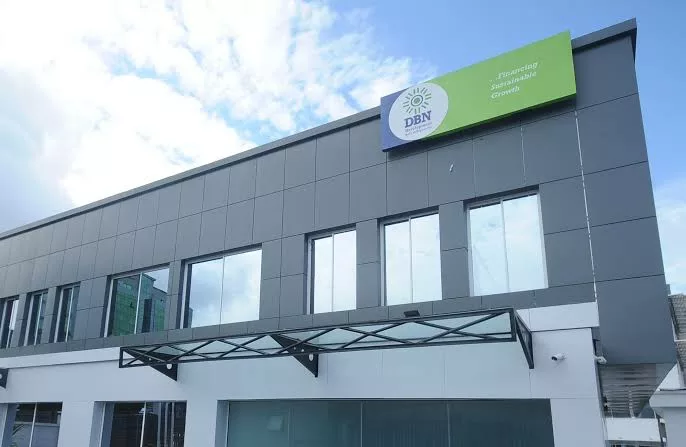Development Bank of Nigeria (DBN) said it has provided more than N631 billion to support Micro, Small and Medium Enterprises (MSMEs) across the agriculture, health, education manufacturing and technology sectors in the country as a way of fostering growth and development.
Speaking with journalists in Lagos, the managing director and chief executive of DBN, Dr Tony Okpanachi, noted that following its contribution towards funding the MSME industry, the bank plans to continue to foster sustainable growth and drive the nation’s economic development trajectory.
According to him DBN has over the past five years provided financing support to its participating financial institutions to the tune of N631 billion as of December 2022.
“Over 313,000 MSMEs have benefited from this support, leading to the creation of more than 900,000 jobs. These numbers signify hope and prosperity for countless individuals and families across the nation,” he said.
He noted that the support for MSMEs in the country had become expedient as more than 80 per cent of the entire population of Nigeria which is more than 160 million Nigerians, depends on the informal economy. This means that the Trade and Commerce sector is the hope of daily survival and livelihood for most Nigerian families and entrepreneurs
“DBN recognises this critical need. As such, more than N230 billion have been channelled to support small businesses in the Trade and Commerce sector over the past five years leading up to December 2022,”he added.
Okpanachi stating that DBN had provided facilities towards the agriculture sector, noted that Nigeria is at the cusp of a food crisis and millions of Nigerians will likely experience acute hunger in 2023 as climate adversely affects the production of food crops.
“Indeed, supporting small businesses in the agriculture sector is crucial for improving food security in Nigeria. The Development Bank of Nigeria (DBN) recognises the significance of agriculture in the country’s economy and has allocated substantial funding to agro-MSMEs. As of December 2022, the Bank has provided N27 billion to Agro-MSMEs.
“This funding has played a vital role in supporting agricultural activities, empowering farmers, and promoting agro-entrepreneurship. The financial support provided by DBN has helped agro-MSMEs to enhance their operations, invest in modern farming techniques, acquire machinery and equipment, expand their production capacity, and access new markets.
“The Development Bank of Nigeria (DBN) has extended its financing support beyond just agriculture to various other sectors, recognising their importance in the overall development and prosperity of the Nigerian economy.
“DBN has provided N13 billion in financing support to MSMEs operating in the hospitality and tourism sector. This funding has helped these businesses to expand their operations, improve infrastructure, enhance service quality, and contribute to the growth of Nigeria’s tourism industry.
“We have also allocated N12 billion in financing to support quality education in Nigeria. This funding has been instrumental in improving educational facilities, promoting skill development programs, and enhancing access to education across the country.
“DBN has channeled N11.5 billion in financing support to the health sector, aiming to improve access to healthcare services and enhance the health conditions of the Nigerian populace. This funding has supported the development and expansion of healthcare facilities, the procurement of medical equipment, and the training of healthcare professionals.
Okpanachi added that “DBN recognises the immense potential of technology and innovation in driving development and digital transformation across sectors. Therefore, it has allocated N11 billion to the technology sector, supporting businesses involved in technology and innovation initiatives. This funding aims to foster increased efficiency, productivity, and expanded market access for Nigerian businesses.
“DBN over the years has taken a customer-centric approach to product development, helping the Bank to meet the diverse needs of different segments and regions within the MSME ecosystem. From our discovery, the challenges of different MSME actors differ, and so are their needs. To address these gaps, DBN has maintained its strong commitment to innovative product development, developing specialised offerings such as the Long-Term Finance (LTF) product to support the PFIs in providing longer-tenor financing to the end-borrowers.
“The Bank also developed the Green Finance product to support businesses facilitating green transitions through renewable energy, sustainable agriculture, sustainable waste management, and so on. The Non-Interest Banking (NIB) product was developed to support small businesses, particularly those that are financially excluded and located in economically challenged regions.
“The Gender Finance Framework developed by the Bank is another attempt to increase the share of women entrepreneurs benefiting from our financing. Over the years, these specialized solutions have enabled us to catalyse more impact on the last-mile enterprises, improve access to finance, and support the development of MSMEs across different segments and locations.”
On capacity building, he said, “We recognise that strong, structured, and sound financial institutions are pivotal to the success of Nigerian MSMEs. To this end, we have diligently worked to strengthen the capacity of our PFIs to deliver on the mandate of alleviating financing constraints among Nigerian MSMEs.
“Through a technical assistance program implemented by the prestigious Frankfurt School of Finance and Management, we have empowered 20 PFIs by augmenting their processes and deepening their ecosystem knowledge of Nigerian MSMEs. This collaborative effort has therefore enhanced the PFIs’ ability to adequately meet the needs of MSMEs, creating a thriving ecosystem for sustainable growth.
“Also worthy of note is that the Development Bank of Nigeria has forged invaluable partnerships, including collaboration with Google Nigeria, the Entrepreneurship Development Centre (EDC) of the Lagos Business School, and other esteemed organisations to deliver capacity-building programs to Nigerian MSMEs.
“In 2022, we took a significant step in empowering Nigerian entrepreneurs by developing a state-of-the-art Learning Management System (LMS) designed to facilitate their upskilling and continuous learning journey These efforts have culminated in the training of more than 4,000 MSMEs as of December 2022, equipping them with the necessary knowledge and skills to overcome financing challenges and drive their growth aspirations.”





